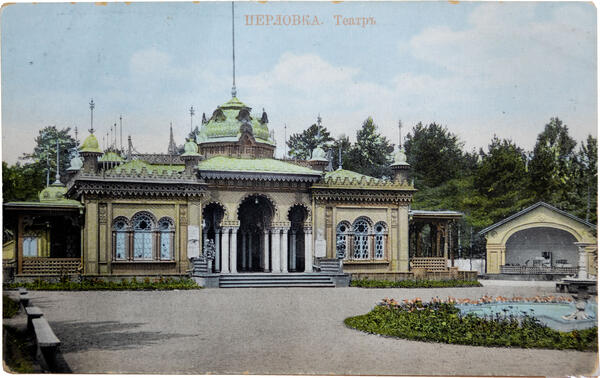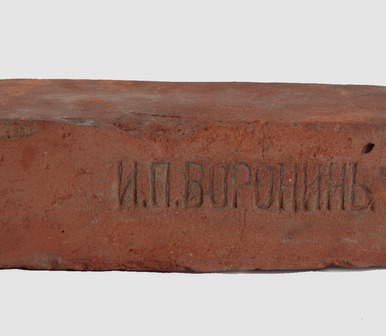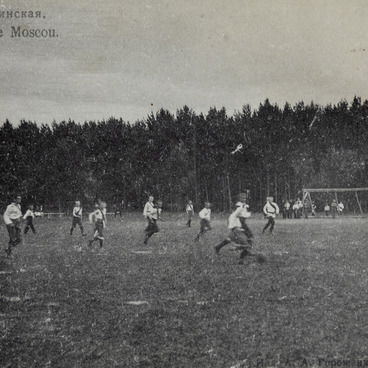The theater in the dacha (summer house) community of Perlovka was opened in 1883. For decades, the theaters of the dacha communities Perlovka and Pushkino competed, inviting as many professional actors as possible, but also they brought shows to each other’s stages. Summer theater became cultural centers of these communities since their halls and stages could be used for other events, too. On theater stages they hosted lectures, concerts, movie screenings, charity nights, fun fairs, and events of social importance, such as balls, festivals, and public holidays.
Famous actors performed high quality shows, which even attracted viewers from Moscow to these country theaters. Usually, night shows included several performances and ended with a dance or an entertainment program. Performances were scheduled several times a week and the remaining time was allocated for music nights and other events.
The summer theater in Perlovka is a beautiful wooden building in the Moorish style. On days without performances it was used for balls and cinema shows. The Perlov’s Orchestra played in a special pavilion for summer balls. In 1897, a lunch party for 100 guests was arranged here to celebrate the consecration of the church in Perlovka.
In 1897, the mezzo soprano Nadezhda Mshanskaya-Sokolova, who had worked in the Bolshoi Theater for a few years, sang on this stage. And the audience was very excited to see Leonid Sobinov who had performed on stage for the Emperor.
The postcard published in 1912 depicts an exquisite wooden building with a circle for dancing in front of it and a pavilion for musicians nearby. In front of the theater there is a flower bed and a fountain. Contemporaries highly praised this building for its beauty.
Theater playbills can give us an idea of how rich the seasonal programme was. On June 20, 1892, the provincial actress O. S. Kadmina-Dievskaya played on the stage of the Perlovka Theater with the operetta ‘Women’s Curiosity’.
A seat in the armchair row cost 2 rubles, the 1st and 2nd chair rows cost 1.50 rubles, and a seat on a bench cost 50 kopecks. During the 1903 season that lasted from May to August, Nikolai Arbatov’s drama troupe and artists from Fyodor Korsh’s Theater performed in Perlovka. On June 4, they played the comedy “Air of the Capital City” starring artists of Fyodor Korsh’s Theater. On June 11, the audience could enjoy the sketch comedy ‘Friend of the Family’ and the comedy ‘A Summer Picture’. On June 18, there were two more comedies. On July 16, they staged a drama by François Coppée. On August 6, Nikolai Arbatov’s troupe staged their farewell shows starring Nikolai Arbatov himself. They performed Alexander Ostrovsky’s ‘Poverty Is No Vice’.
Famous actors performed high quality shows, which even attracted viewers from Moscow to these country theaters. Usually, night shows included several performances and ended with a dance or an entertainment program. Performances were scheduled several times a week and the remaining time was allocated for music nights and other events.
The summer theater in Perlovka is a beautiful wooden building in the Moorish style. On days without performances it was used for balls and cinema shows. The Perlov’s Orchestra played in a special pavilion for summer balls. In 1897, a lunch party for 100 guests was arranged here to celebrate the consecration of the church in Perlovka.
In 1897, the mezzo soprano Nadezhda Mshanskaya-Sokolova, who had worked in the Bolshoi Theater for a few years, sang on this stage. And the audience was very excited to see Leonid Sobinov who had performed on stage for the Emperor.
The postcard published in 1912 depicts an exquisite wooden building with a circle for dancing in front of it and a pavilion for musicians nearby. In front of the theater there is a flower bed and a fountain. Contemporaries highly praised this building for its beauty.
Theater playbills can give us an idea of how rich the seasonal programme was. On June 20, 1892, the provincial actress O. S. Kadmina-Dievskaya played on the stage of the Perlovka Theater with the operetta ‘Women’s Curiosity’.
A seat in the armchair row cost 2 rubles, the 1st and 2nd chair rows cost 1.50 rubles, and a seat on a bench cost 50 kopecks. During the 1903 season that lasted from May to August, Nikolai Arbatov’s drama troupe and artists from Fyodor Korsh’s Theater performed in Perlovka. On June 4, they played the comedy “Air of the Capital City” starring artists of Fyodor Korsh’s Theater. On June 11, the audience could enjoy the sketch comedy ‘Friend of the Family’ and the comedy ‘A Summer Picture’. On June 18, there were two more comedies. On July 16, they staged a drama by François Coppée. On August 6, Nikolai Arbatov’s troupe staged their farewell shows starring Nikolai Arbatov himself. They performed Alexander Ostrovsky’s ‘Poverty Is No Vice’.



